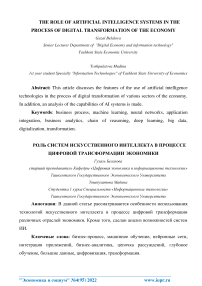The role of artificial intelligence systems in the process of digital transformation of the economy
Автор: Belalova G., Toshpulatova M.
Журнал: Экономика и социум @ekonomika-socium
Рубрика: Основной раздел
Статья в выпуске: 4-1 (95), 2022 года.
Бесплатный доступ
This article discusses the features of the use of artificial intelligence technologies in the process of digital transformation of various sectors of the economy. In addition, an analysis of the capabilities of AI systems is made.
Business process, machine learning, neural networks, application integration, business analytics, chain of reasoning, deep learning, big data, digitalization, transformation
Короткий адрес: https://sciup.org/140291561
IDR: 140291561
Текст научной статьи The role of artificial intelligence systems in the process of digital transformation of the economy
In modern business conditions, in order to ensure financial stability, companies need to make maximum efforts to maintain the efficiency of business processes. The use of existing information technologies allows you to quickly respond to changes in business events and, as a result, eliminate bottlenecks in the process of making managerial decisions.
Technological integration of applications, business rules and technological processes, business intelligence tools and process management software provides a technical and economic opportunity for continuous monitoring of business processes. Due to the convergence of software for BI (Business intelligence) and business process management (Process management, BPM), analytical business process management (business process intelligence, BPI) has appeared: the application of a BI-oriented, performance-based approach to business process management (Fig.1).

Fig.1. Integration of software applications 1
Traditional automation of business processes is no longer enough today. For effective management of business and IT investments, the issue of obtaining various analytical information about business processes in order to increase the return on investment becomes relevant. [4]
The basis of business intelligence is artificial intelligence (AI) technology. A subset of AI is machine learning and neural networks.
While AI is a system or device designed to work with intelligence, machine learning is a more specific term that refers to systems that are designed to receive information, usually in a specific area, and learn from what is given to them2.
BI systems are characterized by the ability to evaluate and structure the data obtained, then draw conclusions from it using the appropriate chain of reasoning, i.e. to obtain a decision or conclusion.
Deep learning is a type of system that is designed to solve unstructured data problems in the real world. It is aimed at large and dynamic datasets. Deep learning is usually carried out using neural networks.[5]
Neural networks model the structure and function of the human brain. As information enters the neural network, connections between nodes are established, strengthened or decreased, similar to the connections of neurons in the human brain, which are strengthened with the acquisition of experience.
To identify the real world, the AI system receives data in the form of symbolic, numeric and multimedia messages (Fig. 2). After that, these data are processed, during which a deep learning system is used to obtain the resulting information. Data is aggregated and the machine learning platform processes this data.
|
Data with patterns |
^ |
Learning algorithm |
^ |
Pattern model |
^ |
Finding patterns in new data |
Fig.2. Technological scheme of machine learning 3
After processing the data, AI systems use various types of training to receive and process information about the real world. The result is patterns and trends that generate understanding, and then the system takes various actions to manage the resulting value. The resulting value is used as input data to improve the self-learning of the system.
Currently, this technology is used in various subject areas, such as business analytics, diagnostic maintenance using IoT, search recommendations, forecasting models, chatbots, voice interface of smart homes and industries.[1]
In the context of the formation of the digital economy, it is necessary to have the necessary platform for the development of AI. In solving this problem, experts in the field of artificial intelligence play a decisive role, which is sometimes not given due attention.
As a result, there is a change in curricula and programs in education, new disciplines appear that help in the development of necessary skills and competencies. Today our world has entered the process of digital transformation, it has affected absolutely all sectors of the economy. The modern economy is increasingly based on large, dynamic data, so AI technology is one of the most popular areas.
Список литературы The role of artificial intelligence systems in the process of digital transformation of the economy
- Grossmann, Wilfried, Rinderle-Ma, Stefanie, Fundamentals of Business Intelligence, Springer, 2015. ISSN 2197-9723 ISSN 2197-974X (electronic) Data-Centric Systems and Applications 978-3-662-46530-1 978-3-662-46531-8 (eBook).
- DOI: 10.1007/978-3-662-46531-8 ISBN: 978-3-662-46530-1
- Paklin N.B., Oreshkov V.I. Business analytics: from data to knowledge: Publishing House: Peter,2013, 978-5-459-00717-6.
- ISBN: 978-5-459-00717-6
- https://www.iemag.ru/analitics-No.16(81),Intelligent business processes//By Mark Smith.
- https://cyberleninka.ru/article-Technologyartificial intelligence in the context of the business environment. Mustafina A. F.


